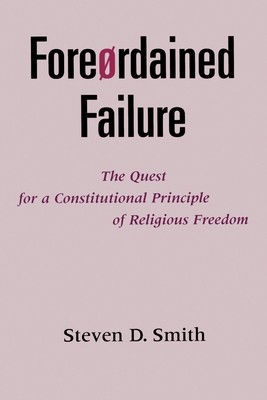
- We will send in 10–14 business days.
- Author: Steven D Smith
- Publisher: Oxford University Press, USA
- ISBN-10: 0195132483
- ISBN-13: 9780195132489
- Format: 15.4 x 22.9 x 1.3 cm, minkšti viršeliai
- Language: English
- SAVE -10% with code: EXTRA
Reviews
Description
Ever since the Supreme Court began enforcing the First Amendment's religion clauses in the 1940s, courts and scholars have tried to distill the meaning of those clauses into a useable principle of religious freedom. In this highly original work, Smith criticizes the main positions in the debate and explains their misconceptions. He argues that efforts to find a principle of religious freedom in the "original meaning" are fruitless because the clauses were purely jurisdictional in nature: they were meant to place authority over questions of religion with the states, and nothing more. Contending that the perennial quest to distill religious freedom into a "principle," is futile, Smith advocates a fundamental reassessment of the premises upon which courts have proceeded in this area.
EXTRA 10 % discount with code: EXTRA
The promotion ends in 23d.01:20:04
The discount code is valid when purchasing from 10 €. Discounts do not stack.
- Author: Steven D Smith
- Publisher: Oxford University Press, USA
- ISBN-10: 0195132483
- ISBN-13: 9780195132489
- Format: 15.4 x 22.9 x 1.3 cm, minkšti viršeliai
- Language: English English
Ever since the Supreme Court began enforcing the First Amendment's religion clauses in the 1940s, courts and scholars have tried to distill the meaning of those clauses into a useable principle of religious freedom. In this highly original work, Smith criticizes the main positions in the debate and explains their misconceptions. He argues that efforts to find a principle of religious freedom in the "original meaning" are fruitless because the clauses were purely jurisdictional in nature: they were meant to place authority over questions of religion with the states, and nothing more. Contending that the perennial quest to distill religious freedom into a "principle," is futile, Smith advocates a fundamental reassessment of the premises upon which courts have proceeded in this area.


Reviews